- Home
- James Y. Bartlett
P.G.A. Spells Death
P.G.A. Spells Death Read online
Contents
Title Page
Copyright
Dedication
C1
C2
C3
C4
C5
C6
C7
C8
C9
C10
C11
C12
C13
C14
C15
C16
C17
C18
C19
C20
C21
C22
C23
C24
C25
C26
C27
C28
C29
C30
C31
C32
C33
About James Y. Bartlett
Contact
An Open Case of Death excerpt
P.G.A. Spells Death
A Hacker Golf Mystery
James Y. Bartlett
Copyright © 2020 by James Y. Bartlett
A Yeoman House Books Original E-Book
All rights reserved.
This Yeoman House edition of P.G.A. Spells Death is an original publication. It is published by arrangement with the author.
This book is a work of fiction. All of the events, characters, names and places depicted in this novel are entirely fictitious or are used fictitiously. No representation that any statement made in this novel is true or that any incident depicted in this novel actually occurred is intended or should be inferred by the reader.
No part of this book may be used or reproduced in any manner whatsoever without written permission except in the case of brief quotations embodied in critical articles or reviews. For information, address Yeoman House Books, 10 Old Bulgarmarsh Road, Tiverton, RI 02878.
Cover Design: Todd Fitz, Fuel Media, Inc.
Printed in the USA.
ISBN 978-0-9852537-7-6
Library of Congress Control Number: 2020941590
For Susan
I keep six honest serving men (they taught me all i knew); Theirs names are What and Why and When And How And Where and Who.
-- Rudyard Kipling
Author's Note:
The world of television technology and production is one that’s mostly foreign to an old print guy. Luckily, however, I have an expert in the family, and one with excellent bloodlines. My father-in-law, Robert Alshouse, was one of the pioneers of TV news in south Florida. I married one of his daughters; the other, my sister-in-law Janet Alshouse, was hired by Roger Ailes to become the first news director for a fledgling little network he was starting up called Fox News. Her advice, expertise and general cheerleading have been invaluable in the creation of this novel and are much appreciated.
--J.Y.B.
1
The meeting was held in a windowless room on the 34th floor of the IBS Building in Manhattan. Way up there, without a window to let in any sunshine, or views, or air, we couldn’t hear the constant noise from the street far below. No honking car horns, no screaming NYPD sirens, no hydraulic bus brakes pfsshing as the bus pulled away from the curb, ground through the gears and exhaled clouds of diesel exhaust. Up here, we were wrapped, captured maybe, in our silent and sterile environment.
It was early March and the Golf Sports Group of the International Broadcasting System was gathering to discuss the plans for the upcoming slate of PGA Tour tournaments we would be broadcasting to a grateful nation, including the biggie here on IBS, the PGA Championship, one of golf’s four majors, scheduled for mid-May. In the interest of generating the most revenue possible, the various golfing bodies and institutions had doled out broadcasting rights to the four major championships to four different networks: CBS, of course, owned the Masters; NBC got the British Open, Fox Sports the U.S. Open and IBS the PGA. The Golf Channel suckled on the hind teat of all of them by broadcasting the Thursday/Friday rounds of all the majors except the Masters, which worked with ESPN.
People were slowly drifting in to the long rectangular room, painted in navy and decorated with an array of flat screen monitors covering the far wall. Half of the screens were dark, but some showed the live feed from what was being broadcast at the moment (a soap opera—it was just after lunch) and others had silent camera feeds from various news studios in the building and elsewhere from IBS’ extensive worldwide network of stations.
I knew a few of the people who filed in, took a seat and nodded at one another. But most of them were complete strangers to me. I found a seat midway down the length of the table. I had officially joined IBS at the beginning of the year, after my longtime job as the golf writer for the Boston Journal had been eliminated the year before. I had spent the intervening time writing a book for the U.S. Golf Association, helped uncover a financial scam at Pebble Beach during the U.S. Open and welcomed my son, DJ, into the world. Rather an eventful year, all told. And then the Pebble Beach-based movie star and director Jack Harwood had put me in touch with Bill Pulte, head of IBS Sports, and we had talked and here I was. My title was “correspondent” and my job was to feed colorful, interesting and historic pieces of golfiana into the IBS golf broadcasts to make the “talent”—the announcers—sound like they knew what they were talking about.
None of the talent was expected to join this high-altitude meeting today. That group, a mix of experienced broadcasters and former Tour players grown long of tooth and sent off to the booth, didn’t need to bother their pretty heads with schedules, logistics and technology updates. Their job was just to show up, clear their throats, climb the ladders to the aeries above the various putting greens and wax poetic about the action unfolding down below.
So the attendees at this meeting were the executives in charge of technology—the RF cameras and the satellite uplinks and the flyboard units—logistics—the 18-wheeler trucks and the cable layers and the tower scaffold builders and the canteen staffers—and marketing and promotions. I wasn’t exactly sure what purpose my attendance served, but I had been told to show up and meet some of my co-workers, so I had, despite my lifelong aversion to meetings. As the golf writer for the Journal, I had pretty much kept my own hours, traveled almost every week, rarely worked in the office, and the only meetings I ever had were over the phone with my obese executive editor, who was a blithering idiot. Which had kept our meetings short. And profane.
This one had been scheduled to begin at one thirty. At one forty-five, most of the tall-backed chairs around the long mahogany table were filled, along with about half of the row of chairs set against the walls, and the conference table itself was covered with notebooks, laptops, Coke cans and coffee cups. There was a dull hum in the room as people chatted with each other.
And then the door opened and Ben Oswald walked in. The room fell instantly silent, as if an invisible hand had flipped the talk and chatter switch to off.
To say the executive producer and director of IBS Golf had a presence would be like saying George Washington was once the head of something. Ben Oswald exuded command and control. He was a small man, size-wise, with a head of curly gray hair, a long, sloped forehead, large bulbous nose and amber-lensed aviator-like glasses. But he walked with a body in tension and looked like every sinew and synapse was wound as tightly as possible and on the verge of snapping. His mouth was pursed in a constant frown, one of his signatures, and his eyes danced around the room without expression, taking everything in, nodding here and there at some of the gathered. He wore black corduroys, a white open-collared dress shirt with wide collar points, and an expensive-looking multi-hued sweater.
He was followed into the conference room by a young man who looked to be in his mid-twenties, wearing a pinstriped suit, exquisitely tailored right down t
o the pocket square and vest, and a pair of ankle-high black shiny boots that probably cost a grand at Barney’s. He was carrying a leather binder in cordovan red. He took a seat against the wall, zipped open his notebook and began making notations with a huge Cross pen he extracted from his inside coat pocket. I noticed that most of the people in the room avoided looking directly at him. Everyone was focused on Oswald, the alpha male.
Oswald plopped himself down at the head of the table, back to the wall of monitors, and surveyed the room. Naturally, his gaze stopped on me.
“Who the hell are you?” he snapped.
“Hacker,” I said. “Correspondent.”
Oswald turned and raised one eyebrow at the young man in the expensive suit.
“New hire,” the young man said primly. “History and color. Bill recommended him.”
“Fuckin’ Bill,” Oswald said, shaking his head. He turned to glare at me again. Everyone else in the room was looking at me too. I thought about bursting into song—for some reason “It’s a Hard Knock Life” from Annie came to mind —but I managed to keep myself under control.
“Whaddya you know about television?” Oswald spat at me.
“Ummm,” I said, “If it bleeds, it leads?”
There was a deathly silence in the room for a few beats. Then I heard someone snort and someone else giggled. Maybe not the gales of laughter I had hoped for, but I’d take it.
Oswald didn’t say anything. His face was impassive, unreadable. His fingers twitched on the table. His eyes stayed locked on mine.
“Fuckin’ wise guy, huh?” he said.
His eyes left mine and moved around the table.
“Chuck,” he said, barking out that unfortunate’s name. “What’s up with that new mini cam? I heard CBS got one.”
“Right, Ben,” said a man sitting across the table from me. He was large, bald and looked worried. “Got one right here.” He held out his hand and showed us all a small black box maybe three inches square with a round lens on one end. “HDR, 60 fps, 4K output, but weighs just 128 grams. You can bury it in the wall of a bunker, or stick it on a pole and wide-angle the tee box. Shoots in 4K and downconverts automatically. Pretty cool shit.”
“Good,” Oswald said. “Order six of them and let’s get them into the mix.”
“Budget!” The voice came from a woman three seats down from me. She had a large spreadsheet unfolded in front of her. “Those things cost fifteen thousand each. We budgeted for three.”
Oswald’s face turned red. He glanced over at the three-piece suit kid, who shrugged and nodded.
“Okay, get me four, then,” Oswald said. “And if we miss a good shot because we don’t have enough cameras, Camilla, I’ll come find you and eliminate your life and your little dog’s too.”
Oswald pointed at another unfortunate sitting two chairs away from me.
“Billy Bob,” he said. “What’s happening with the drones? If we’re gonna put the Goodyear blimp out of business, those fuckin’ things gotta work. I want to be able to dive bomb one of those things so I can see every pimple on Phil Mickelson’s ass.”
“R-r-right Ben,” Billy Bob quavered. “AirShot has a fourth generation machine out. Noise level is less than twenty decibels and it can go as high as two thousand feet. And they’re supposed to be strong enough to carry the AB-75 HD camera with a directional mic. I’m going out to Palm Springs next week for a demo.”
“I don’t want ‘supposed to be,’ you moron,” Oswald said. “If it works, buy it. Better still, just lease a half dozen. Then Camilla won’t have a coronary. Right darlin’?”
“Whatever you say, Ben,” the woman from accounting said, her head buried in her spreadsheet.
Oswald went around the table and the room in a similar vein. He’d bark out a question, wait for the stumbling answer, and then respond with some kind of acerbic insult or comment. It reminded me of his nickname in the industry—”The Assassin.” It had been applied to Oswald permanently, according to the story I’d been told, at a production meeting years ago when one of the former PGA Tour players who had transitioned into the broadcast booth had endured about 30 minutes of nonstop insults for challenging something about the “IBS way” of doing things. After being called every name in the book, and asked if his IQ was possibly higher than that of a garden slug, the player-turned-broadcaster had looked at Ben and asked “Say, Oswald, are you related to Lee Harvey, by any chance?”
After that, they called him The Assassin. Mostly behind his back, but those close to Oswald had said that he was secretly pleased with his nickname. He thought it gave him power, for some reason.
The door to the conference room opened and an older man walked in. He was dressed in a well-tailored suit, but not nearly as pristine as the one worn by Oswald’s assistant. He had a head of curly, graying hair, a pencil-thin mustache and a look on his face like he was suffering from some kind of severe gastrointestinal distress.
“Listen up people,” Oswald said when he saw the man. “For those who don’t know, this is Frank Corso, our senior veep for golf production. He might have something interesting to say, Frank?”
Corso stood at the head of the table opposite Oswald, and nodded towards the group.
“Won’t take up much of your time, Ben,” he said. “Just wanted to say on behalf of the network that this is an important year for our golf telecasts. You’ve all probably heard that the network is in merger talks, right? There’s nothing definitive I can tell you at this moment, and probably nothing will happen before the end of the year. But I just want to remind you that we expect you to continue producing the best golf broadcasts in the business this year. Whatever happens on the corporate level, this team just needs to keep doing the job you have demonstrated you know how to do. You take care of your business, and we’ll do the rest. Okay? Thanks, Ben.”
Corso nodded again, then turned and walked out. The room was silent for a moment after he left. I could almost feel Ben Oswald swelling up with snark at the head of the table, and I had only known him for about thirty minutes.
“Well that was a word sandwich full of baloney,” Oswald said finally. “I think what he meant was do your fucking jobs or I’ll fire each and every one of your sorry asses. Of course, that’s nothing new. I’ve said that at the beginning of every year I’ve been doing this job, which is … how many, Arnie?”
“Twenty-one, Ben,” said the young man in the suit.
“Twenty fucking one years,” Oswald said. “Old enough to drink, drive and screw, so I oughta know how to do a golf broadcast. And so should you. So screw what the suits say … just do your job or I’ll find someone who can. We all straight?”
There were murmurs of agreement around the room.
“Good,” Oswald said. “Now get out of here and get back to work. We’ve got Savannah coming up in three weeks and we’re gonna be ready or I’ll be crawlin’ up your colon to find out why. Go!”
The meeting broke up as everyone stood up, gathered whatever material they had brought in, and began to leave.
“Digby!” Oswald’s voice was like a whip crack. Everyone in the room flinched. “And Hacker! Stay.”
I sat back down. Across the table from me, so did the person named Digby. He was a youngish man, maybe late twenties, dressed in a white dress shirt and blue jeans. He was round in shape, maybe not quite pudgy but far from ripped. His cheeks were puffy and his stringy hair on the wild and unmanageable side. His complexion was spotted. And his eyes were wild, white, darting, nervous.
The room cleared fairly quickly, as people seemed anxious to get away from Oswald. You could almost hear the exhalations of relief when they made it to the hallway outside without any further metaphorical daggers protruding from their backs.
Oswald kept his seat, his fingers drumming on the surface of the conference table again. The three-piece suited fellow also stayed in his chair against the wall. His notebook was still open and he was looking at Digby and me
with a small smile playing at the corners of his mouth. He seemed to be anticipating, with some pleasure, what was to come.
“OK, Digby,” Oswald said when the room had finally emptied out and the door swung shut. “You know why you’re here, right?”
“I-It wasn’t my fault, Ben,” Digby said. His voice was on the high side. Tremulous. And it sounded nervous.
“It’s never your fucking fault, is it Digs?” Oswald said, his voice dripping with venom. “Every single last time you screw something up, it’s somebody else’s fault. Why is that, you fat faultless fuck?”
I had to give Oswald high marks for alliteration, but Digby looked like he wanted to cry.
“The control synthesizer was connected to the outward-bound router on the server,” he said, voice wavering but not breaking. “Something went wrong on the upload to satellite. We don’t know what it was yet. We’re still running tests …”
“Tests.” Oswald repeated the word as if it were a synonym for excrement. “I got a live broadcast going out over the air and I cannot see the replay graphics because you put Wire A into some goddam incorrect Connector B and you’re fucking giving me tests!”
He turned and looked at the notebook guy, who I now understood to be his aide-de-camp, major domo or personal assistant. Whatever they called them these days. “How many times has this piece of hardware failed in the last six months?” he asked.
Notebook guy flipped through some pages. “Six,” he said finally.
“Six!” Oswald’s whipcrack voice repeated the number. Loudly. Both Digby and I flinched.
“Now you listen to me, fat boy, and you listen good,” Oswald said. “If by any chance we manage to get to the number seven …” He stopped. “Why don’t you tell me what will happen.”
“Uh, my ass is grass?” Digby said.
“Oh, Digs, we are way beyond grass,” Oswald said, shaking his head sadly. “We are past grass, into a whole other dimension of plant life. Another mother-fucking universe of grass, my jowly little friend. I will have you drawn and quartered. I will have you de-pantsed. I will cut off your balls and jam them down your throat. I will pull the toe nails off your feet with a pair of pliers. I will take that outward-bound router and send it inward bound into your small intestines. Have I made myself clear?”

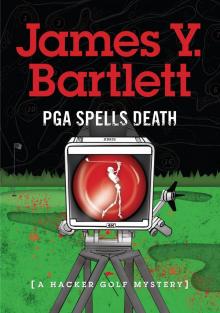 P.G.A. Spells Death
P.G.A. Spells Death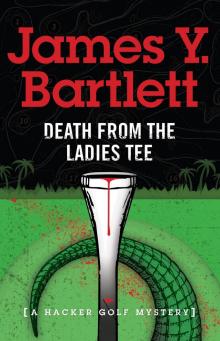 Death from the Ladies Tee
Death from the Ladies Tee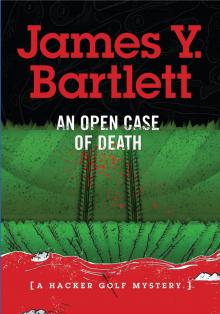 An Open Case of Death
An Open Case of Death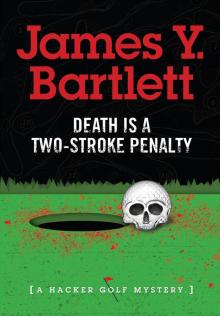 Death is a Two-Stroke Penalty
Death is a Two-Stroke Penalty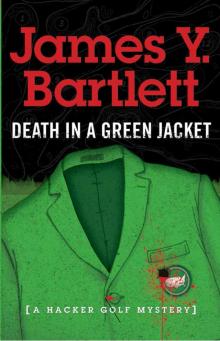 Death in a Green Jacket
Death in a Green Jacket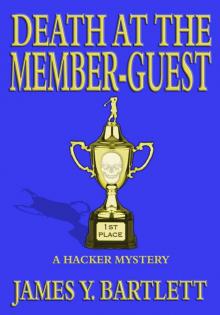 Death at the Member Guest
Death at the Member Guest